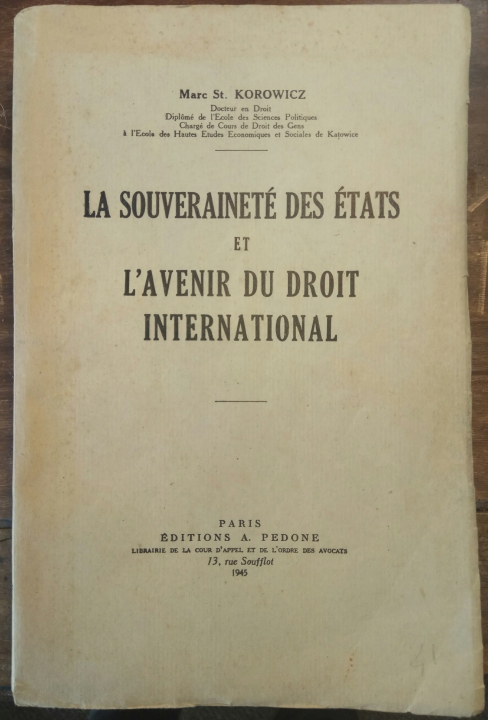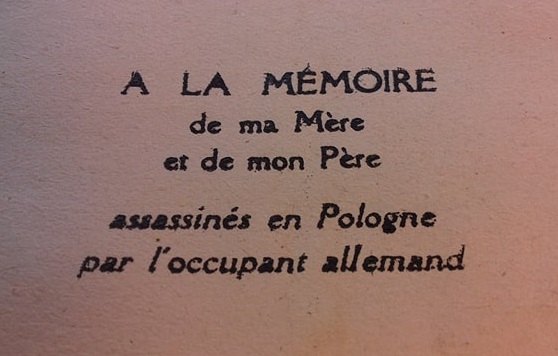.

.
“During the inter-bellum and throughout the war which began in 1939, innumerable articles were published in the daily press and periodicals denouncing international law, whose beautiful rules were consigned to remain only on paper as two wars, with increasing atrocity and devastation, raged throughout all corners of the world. However, if any accusations levelled at international law came from jurists, they were not only ill-founded and glib, but increasingly rare. As for opinions from non-legal quarters which decry the ineffectiveness of international law, they can be considered entirely justified, but it is not the juridical character of the law which is at fault, rather the present state of that law which has failed on account of ambitions, egos, and a lack of mutual understanding among states, which must ultimately carry the blame.”
.
On the face of it, this shelf-parched, soft-bound tome, written in France during the Second World War, did rather well to survive this far. I recently saved it from the oblivion of a book depository in Aquitaine. The year and location of its publication, the identity of its author, the subject and content, the small number of the imprint and even the quality of the paper it is printed on are all testament to the unlikelihood of its existence let alone the likelihood it may have anything of note to say to the modern reader. La Souveraineté Des États et L’Avenir Du Droit International (“The Sovereignty of States and the Future of International Law”) was written by my granduncle Marek Stanisław Korowicz, whose story I have documented here previously. Marek, a professor of International Law, represented Poland at the League of Nations in the interwar period, specialising in the complicated sovereignty of the disputed territory of Silesia, with its Polish, German and Czechoslovak claims. ¹
.

Marek after his defection from the Polish People’s Republic United Nations delegation in New York (September 1953)
.
When World War II broke out, Marek made his way east (visiting my father and grandparents briefly in Lwów), before escaping through Romania and making his way to France. There he joined the Polish 5th Rifle Regiment and fought with the French Army until its surrender. A fluent francophone from the days of his post-graduate studies in France and Switzerland, he joined the intellectual underground, producing books and pamphlets denigrating fascism and communism. As he would later describe in his book W Polsce pod Sowieckim Jarzmem (“In Poland Under the Red Yolk”), he made the fateful decision to return to Poland in 1946 to recommence his work as a professor.² He is best remembered for his dramatic escape from the Polish People’s Republic in 1953 by renouncing his diplomatic credentials to the United Nations in New York.
.
Cutting through the unopened pages with a paper-knife holds a specific fascination, not only for the light it shines on the personal circumstances of Marek in occupied France, but also for the aptness of its theme. That a man whose expertise is International Law should be going back to the drawing board in the midst of a brutal war in which every edifice and instrument of law seemed to have failed, and failed spectacularly, perhaps shows the tenacity of his choice of profession; but knowing as I do that he had lost his parents, siblings, and cousins in that war, had been living in exile and in fear of arrest, and within two years is going to return to his Polish homeland to discover that any hope of a just society there based on the rule of law will be crushed by a Soviet policy of political interference, administrative manipulation and the threat of military force makes the pages turn with a fatalism that stems from this reader’s qualified omniscience.
.
The final page notes that this book was written in Chambéry and Grenoble between March 1943 and March 1944. Marek was then working with the resistance movement. Following Italian occupation, the Germans invaded Grenoble in September 1943. The self-styled capital of the Maquis witnessed a year of sabotage, ambush, and brutal retaliation before the Germans finally withdrew on 22nd August 1944.
.
Marek survived the war in the French underground. As he was all too aware by the time he published this book in 1945, with the war finally at an end, the toll his own family had paid for being Jewish, or Polish, or educated would become tragically clear. His father had been successful Jewish lumber merchant Joachim Kornreich. Although Marek adopted the Polish surname Korowicz from the start of the Second Republic in 1918 and became a Catholic through marriage, his choice of profession and not his ethnic origins could very well have resulted in his extra-judicial murder if he had not managed to escape from occupied Poland in 1939. That was in fact the fate of his brother and fellow professor, my grandfather Henryk Korowicz who was murdered in Lwów in July 1941 along with 24 of his colleagues.
.
Marek dedicates the book to his parents whom he was not to see again. Eighty-year old Joachim was beaten to death by German soldiers in Lublin in 1939. Joachim’s wife Gisela disappeared into that charnel house of human slaughter where international law had been most ineffective.
.

“To the memory of my Mother and my Father, murdered in Poland by the German occupier.”
____________________________________________________________________________________________